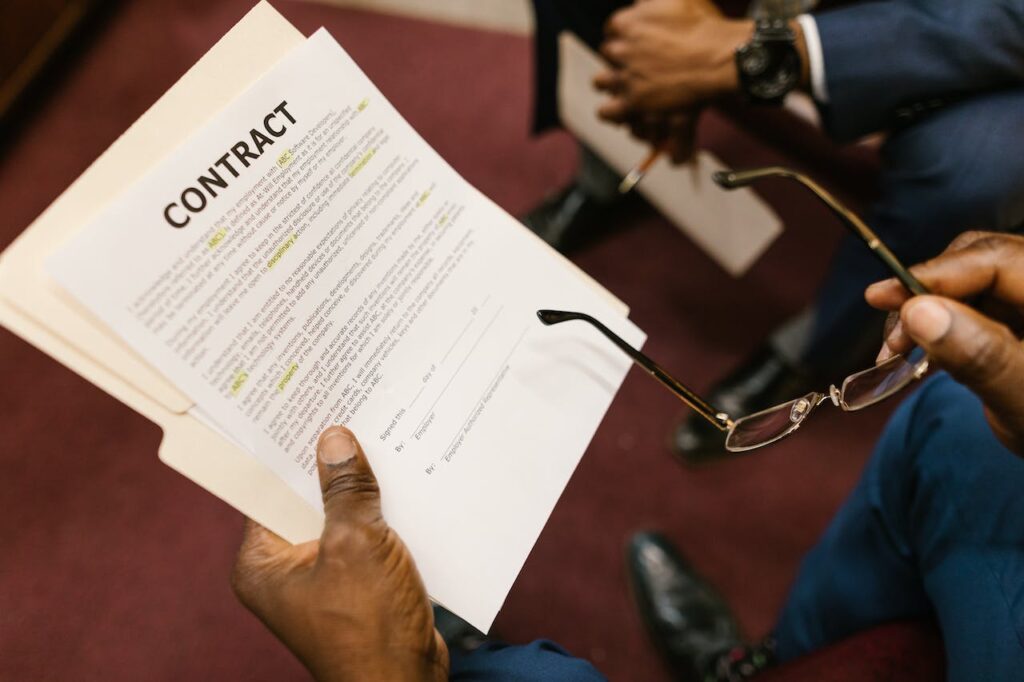Mediation is an alternative dispute resolution method found under The Mediation Bill of 2020 to help parties resolve conflicts without going to court. One common question people have is whether they need a lawyer for mediation. The answer depends on the specific circumstances of the case.
Having a lawyer for mediation in Kenya is optional as it is primarily handled by the parties involved and a neutral third party (mediator). However, having a lawyer helps understand the mediation agreement’s legal implications and makes it legally binding.
In most mediations, parties do not need a lawyer’s direct participation. However, consulting with a lawyer and having them negotiate on your behalf is always beneficial.
For example, consulting with a lawyer can be helpful if the issues involve complex legal or financial matters or if one party feels at a disadvantage negotiating with the other without legal representation.
Contact Kraido Advocates for legal representation in your mediation or further consultation by calling +254 799 180 755, emailing mail@kraidoadvocates.com, or sending us a message via our Free Inquiry Form.
How Mediation Lawyers Help
Mediation is a process of resolving disputes outside of court with the help of a neutral third party.
While having a lawyer for mediation in Kenya is not a must, a lawyer’s participation can be beneficial in the following ways:
1. Providing Legal Advice
One of the primary roles of a lawyer in mediation is to provide legal advice to their client. This advice can help the client understand their legal rights and obligations and how they may be affected by the proposed settlement.
A lawyer can also help their client identify any legal issues that may arise during the mediation process and provide guidance on addressing them.
2. Negotiation Assistance
Another role of a lawyer in mediation is to provide negotiation assistance. A lawyer can help you identify your interests and goals in the dispute and develop a negotiation strategy to achieve them.
Lawyers also help clients communicate effectively with the other party and the mediator and advocate for their client’s position during the mediation process.
3. Legal Documents Review
A lawyer can also assist with document review during the mediation process. This can include reviewing any agreements or proposals made during the mediation process to ensure that they are legally sound and in their client’s best interests.
A lawyer can also help their client understand the legal implications of any proposed settlement and prevent future legal pitfalls.

Critical Factors in Determining Whether You Need a Lawyer for Mediation
Mediation is a voluntary process where determining whether or not you need a lawyer for mediation depends on several factors.
1. Complexity of the Case
If the case is simple and straightforward, the parties involved may not need a lawyer for mediation.
However, if the case is complex and involves complicated legal or financial issues, there are many benefits to having a lawyer present.
A lawyer can provide legal advice and help interpret the legal implications of the decisions they make during mediation.
2. Legal Rights and Obligations
If parties in a mediation are not familiar with their legal rights and obligations, they may need a lawyer for mediation.
A lawyer can help the parties understand their legal rights and obligations and ensure that their interests are protected during the mediation process.
3. Emotional Dynamics
Mediation can be an emotionally charged process, especially if parties are closely related and the element of betrayal exists in the case or have a history of conflict.
In such cases, having a lawyer present can help parties stay focused on the issues at hand and avoid getting sidetracked by emotional dynamics.
Additionally, family cases such as divorce, child custody hearings, and land matters are often best solved through mediation, as it allows solutions both parties agree on.
Parties in mediation should consider the complexity of the case, their legal rights and obligations, and the emotional dynamics involved before deciding whether or not to have a lawyer present during mediation.
Benefits of Having a Lawyer During a Mediation
While it is not necessary to have a lawyer present during mediation, it can be beneficial to have one for the following reasons:
1. Legal Insight: Lawyers provide valuable legal advice and can explain the legal implications of potential decisions.
2. Representation: They represent your interests during the process, ensuring your point of view is heard and understood.
3. Confidence: Having a lawyer can provide relief, confidence, and peace of mind, knowing that a professional is looking after your legal interests.
4. Case Preparation: Lawyers can help gather and organize necessary evidence and formulate a strong case in the initial stages of mediation.
5. Protection: Lawyers can protect your rights and ensure you’re not taken advantage of during the mediation process.
6. Assistance with negotiation: Lawyers are experienced negotiators who can help you reach a favorable agreement.
7. Legal Documentation: A lawyer would handle all the legal paperwork accurately by interpreting, drafting, and filing in court to ensure that the final agreement is legally binding and enforceable under Kenyan Law.
8. Time and Cost Effective: A knowledgeable lawyer can help to streamline the mediation process and save time. Also, reaching an agreement through mediation is significantly less expensive than going to court in Kenya.
Find a Mediation Lawyer in Kenya
Kraido Advocates’ team of lawyers and professional mediators are here to represent you, no matter the complexity of the case or your circumstances.
Contact Kraido Advocates for legal representation in mediation by calling +254 799 180 755, emailing mail@kraidoadvocates.com, or sending us a message via our Free Inquiry Form.






